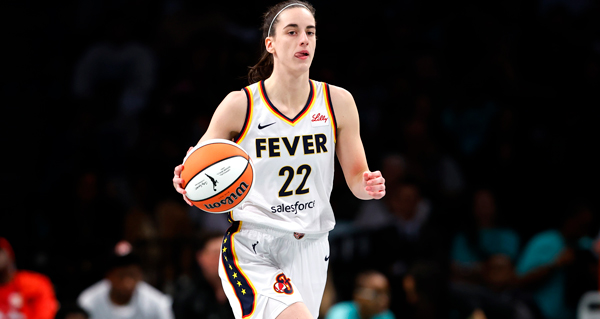Caitlin Clark has been asked every question, but a few weeks into her pro career, she finally got the one she wanted.
After a win in Los Angeles early in the WNBA season, Clark was asked about managing her mental health while capturing the country’s attention in consecutive national title game appearances, quickly followed by an astounding 11 WNBA games in 20 days as a rookie.
“I feel like I talk to the media more than I get to talk to my own family … which is really kind of sad, in a way,” Clark told reporters in L.A. on May 25. “It’s a lot for somebody that’s 22 years old. It can be tough at times.”
Clark isn’t simply getting a lot of scrutiny. She quickly has become a face for the WNBA and women’s sports -- as well what they mean to people. Clark is both more and less than a basketball player now. As easily as her talent makes her the biggest presence on the court, the sports world shrinks her down to a talking point for its next take or tweet.
Standing for her quiet home state, her small market Indiana Fever, and the growth of her overlooked sport, Clark’s every move is being analyzed. On the court we may compare her to Steph Curry or Trae Young, but LeBron James may be the only hooper who knows what she’s going through. In 2003, he joined a Cavaliers team near his hometown that was poorly managed and not very good. He could not fully move in silence no matter what he did.
Still, 2024 is a lot different than 2004. In a world where any social media post or micro movement on the court can be an article, Clark is feeding families beyond Indianapolis or the WNBA. In a recent episode of his podcast Mind the Game, James acknowledged Clark and the other biggest stars in hoops are experiencing scrutiny even he never had to deal with.
“I didn’t have social media to deal with when I came in at 18,” James said. “I did have a lot of scrutiny, I did have a lot of things that was placed on my shoulders, but I didn’t have every single day, around the clock news coverage, sports shows and things talking about this particular person every single day. Or you go online and social media … everyone can comment every single day about whatever they want to say.”
Clark has faced posts and articles about sighing too loudly at a press conference, several supposed rifts with her coach, and dust-ups with players on nearly every WNBA team she’s played against so far.
While praising her poise, James nevertheless encouraged Clark to “keep your mouth shut” for fear of retribution. Enjoy the moment, hone your craft, but pipe down. It’s how James avoided the ire of fans and media, and it’s a recipe that cooks perfectly over the years of a star career.
But it’s not all in Clark’s control. This season alone, reigning Finals MVP A’ja Wilson claimed Clark being white led to her fame and following, not long after WNBA all time leading scorer Diana Taurasi predicted a fall from the mountaintop. This week, Chicago Sky bench guard Chennedy Carter took a cheap shot at Clark and questioned her talent, leading ESPN host Pat McAfee to remind the WNBA that “one white b****” is the reason the league is growing. A local columnist was suspended for creeping her out. Clark has been reduced to less even than her box score line or win-loss record. She is more than an athlete but less than a person.
Clark is following the recognizable footsteps of many basketball stars before her: legendarily talented, poised enough to rise quickly, and turned against in an instant. The past two Marches were her breakout roles, this spring has seen the backlash.
Clark said after that win in L.A. that victory helped her escape the noise, but for how long?
While the Fever star credited head coach Christie Sides for being her rock and often praises her family for helping her navigate stress, Clark can’t possibly wrap her arms around the cloud over her now. Just as she was not solely responsible for the hype train leaving the station two years ago, she can’t stop it now that it’s running off the tracks.
After he missed the entire 2021-22 season with a foot injury, New Orleans Pelicans forward Zion Williamson told Sports Illustrated the compounding of the rehab process plus outside disparagement “did a lot on my spirit.” He said he felt “helpless,” throughout his recovery -- unable to be there for his teammates, unable to dispel narratives that were sharp enough to cut all the way through to his family and loved ones.
Williamson missed most of the following season before a love triangle and threats from an ex kept him in the headlines last offseason just as his playing career hit a nadir.
Clark has not stepped out of line once so far. She sidesteps tough or unfair questions and has constantly paid respects to the pioneers of her sport, including her idol Maya Moore. As a rookie, she has handled the league’s most compact and difficult schedule. All the negativity around Clark comes from others.
Many will say this comes with the territory. Turn a blind eye to the cameras and they’ll stop coming around. Clark can’t do that until her novelty wears off. That doesn’t seem to be coming any time soon. And for athletes, the daily grind of games makes it difficult to fully evade the spotlight.
When ESPN’s Wright Thompson profiled Clark this spring, she sounded a lot like those tabloid stars. Thompson asked her how she keeps her priorities straight amid a media frenzy, high-profile games every other day, and a downpour of new financial opportunities.
"I'm trying to learn about myself as a 21-year-old," she said. "About how I react to situations, what I want in my life, what's good for me, what's bad for me.”
Clark doesn’t have the space to learn those lessons. If these other stories are any indication, unless we all back off her, Clark’s only choice will be to go inward or AWOL. Fortunately, Clark staying out of trouble has a tangible benefit: She can mostly let her play do the talking.
While Memphis Grizzlies point guard Ja Morant served a suspension related to public drinking and gun possession last year, he frequently referred to basketball as “therapeutic.” Upon his return to the court in December, it wasn’t the thrill or even the winning that he was excited to get back in his life. It was basketball, purely.
“I haven’t played a game in eight months, had a lot of time learning about myself, a lot of hard days where I went through it, but basketball is my life and what I love,” Morant said after hitting a game-winner in his first game back.
Where James stands as a reference for how to stay out of trouble, Morant and Williamson represent how quickly folks turn when you slip up. Few know the attention Clark is getting right now; fewer handled it without feeding the detractors.
Despite a disappointing 2-9 start for Indiana and inefficient production from Clark, the No. 1 overall pick is improving. With her pace, passing acumen and deep range, Clark will bend pro defenses just like she did Big Ten competition. Her defense is limiting until she adds strength, but she has been close to net neutral on that end statistically. The coach the internet wants fired is a mentor and confidante for Clark.
Clark is not the first basketball sensation and won’t be the last. But even in basketball, where individual stars rule, she is as polarizing as they come. She does appear headed toward greatness, and the only thing holding her back seems to be the people who claim to be celebrating or analyzing her. If Clark ever pumps the brakes or feels like she cannot give any more, it will be deemed a disappointment when in reality it’s been headed there all along.



